An Isle of Wight councillor has described children who have been mistreated, or lived in a volatile home environment, as ‘future prisoners.’
At a scrutiny meeting yesterday (Tuesday), where members discussed the latest report published by the Island’s Community Safety Partnership (CSP), Conservative Cllr Vanessa Churchman, who represents Havenstreet, Ashey and Haylands, asked about measures in place to help those affected by adverse childhood experiences (ACEs).
Churchman: “Possible prisoner population”
There are several ACE categories including mistreatment, a volatile home environment, substance misuse, domestic abuse and mental health issues — which can have a long-lasting impact on children as they grow up.
Cllr Churchman said:
“If we don’t catch these children at an early age, then we have our future possible prisoner population.”
Preventing adverse experiences reduces risk of imprisonment
A study found children who had experienced four or more ACEs, compared with those who had not experienced any, were seven times more likely to be involved in violence and 11 times more likely to have been imprisoned or used heroin or cocaine.
Data from the same study said preventing ACEs could reduce the risk of imprisonment by 53 per cent.
Brind: No quick solution
Isle of Wight Police Chief Inspector, Rob Brind, said a long-term approach to tackling the issue was being explored.
He said:
“This is about identifying children as early as possible in their life to try to divert them.
“We know all these factors will have an impact on a child and we are working within the CSP and with the children’s safeguarding board — putting things in place to stop that impact happening.
“We are thinking about a long-term strategy around ACEs. It’s not something we are likely to see happen within the next one or two years as this is a process, it is something we are working on.”
The CSP said evidence suggested childhood trauma was strongly associated with a range of medical, psychology and social problems, and greater awareness of ACEs was increasingly important in supporting people and preventing crime.
Data collected in 2016 found late intervention when people had suffered ACEs cost Isle of Wight services £40 million.
This article is from the BBC’s LDRS (Local Democracy Reporter Service) scheme, which OnTheWight is taking part in. Some alterations and additions may be been made by OnTheWight. Ed





